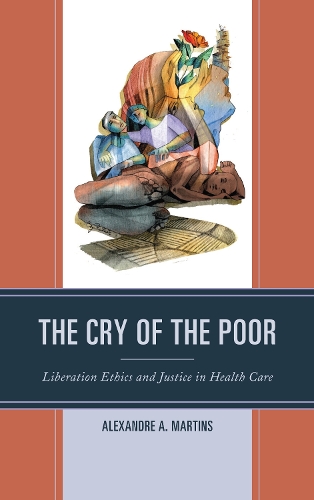
The Cry of the Poor: Liberation Ethics and Justice in Health Care
(Paperback)
Available Formats
Publishing Details
The Cry of the Poor: Liberation Ethics and Justice in Health Care
By (Author) Alexandre A. Martins
Bloomsbury Publishing PLC
Lexington Books
4th March 2022
United States
Classifications
Professional and Scholarly
Non Fiction
Theology
174.26
Physical Properties
Paperback
336
Width 154mm, Height 220mm, Spine 26mm
494g
Description
This book offers an interdisciplinary effort to address global health issues grounded on a human rights framework seen from the perspective of those who are more vulnerable to be sick and die prematurely: the poor. Combining his scholarship and service in impoverished communities, the author examines the connection between poverty and health inequalities from an ethical perspective that considers contributions from different disciplines and the voices of the poor.
Reviews
Martins (Marquette Univ.) here derives an anthropology of suffering from Simone Weils syncretism of Plato and the suffering of Christ, combined with Latin American liberation theology, offering a philosophical/ethical framework to address social justice and health inequities. Paulo Freires pedagogical perspective, the irruption of the poor, drives an emphasis on the unique voice of the poor "from below" that is necessary to scholars and health care professionals as they engage the poor in a dialectical process of liberating education, essential to the social transformation of health care. The Catholic preferential option for the poor, with the non-poor as companions in their struggles, stresses listening to the poor, who are victims of social violence, here considered as experts in existential knowledge. Although primarily philosophical and theological in orientation, Martins's work is highly interdisciplinary, drawing on anthropology, bioethics, and public health disciplines. His text integrates biblical text, Roman Catholic church documents, the "health as a human right versus health as commodity" debate, and the role of grassroots Catholic church organizations as agents of health care and sociopolitical transformation. In his final chapter Martins addresses the application of this multifaceted framework to practical problems of health care delivery, challenging his readers to implementation. Summing Up: Recommended. Graduate students, faculty, and professionals.
* Choice *This book is a multifaceted and interdisciplinary approach to healthcare from a liberation perspective that engages with the poor, listens to them, learns from them and begins a dialogical process of empowering the poor. Martins grounds the right to health care for all in an anthropology of suffering and a liberation ethic that serves as a foundation for a community-based approach of delivering health care in a just way to all people. He challenges all people to join the poor in a dialectical process of mutual learning. Only then will health care ever be realized as a basic human right. The agenda he sets is at the same time ambitious and optimistic, yet realistic and self-critical. This book is essential reading for anyone who wants to understand health care as a basic human right. -- Peter A. Clark, John McShain Chair in Ethics, Director-Institute of Clinical Bioethics, Saint Josephs University
With this book, Alexandre Martins changes the landscape of 21st century theological ethics. Martins interweaves the rigorous philosophy of Simone Weil, an impressive theoretical analysis of liberation theology, and empirical/ethnographic engagement with actual poor people to forward an important new mixed-methodology theoretical/theological framework for addressing the challenges posed by the material suffering of the worlds poor. Yet it is also a beautiful bookinfused with a spirituality formed by Martins long and deep accompaniment with the people of and with whom he speaks. Most importantly, it levies a powerful critique to the academy and US theologians who have turned liberation theology into an academic theory, largely disconnected from actual poor people. As such, anyone interested in liberation theology, liberation ethics, global health, or Catholic social thought going forward will need to grapple with Martins The Cry of the Poor. -- M. Therese Lysaught, Loyola University Chicago
This truly original work will make lights go on across the horizon of Catholic health care ethics and beyond. To the more familiar resources of principle-oriented moral theology, Catholic social ethics, and liberation theology's option for the poor, Martins adds unexpected riches. These include personal experience with Brazil's base communities and its national heath system, as well as the thought of Simone Weil, and a profound spiritual vision. To his compelling calls for social action, Martins unites a fine intellectual analysis that will make this a groundbreaking work in Christian ethics. -- Lisa Cahill, J. Donald Monan Professor of Theology, Boston College
"His monographs main distinction and contribution is that it urges theological bioethicists to encounter and engage, to dialogue with and, especially, listen to the poor regarding justice in health care."
-- Jounral of Theological StudiesAuthor Bio
Alexandre A. Martins is assistant professor in a joint position between the Department of Theology and the College of Nursing at Marquette University.
